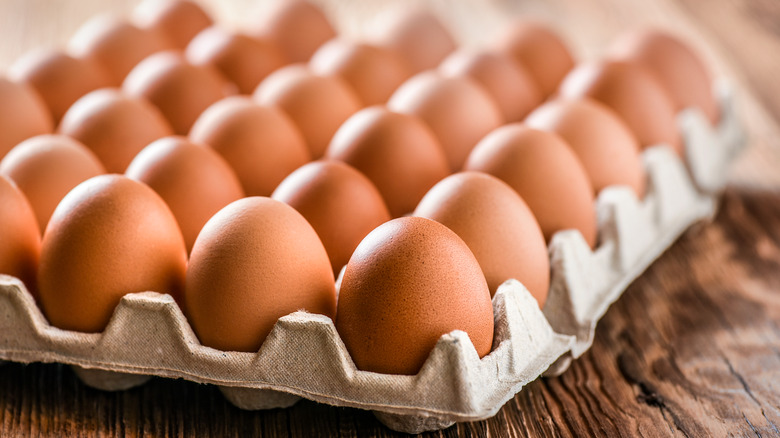This Storage Tip Can Keep Your Eggs Fresh Longer
One simple food storage tip could increase the lifespan of your eggs — storing them upside down.
Speaking to Well+Good, Lisa Steele, a fifth-generation egg farmer and author of the "Fresh Eggs Daily Cookbook," shared that by storing the eggs with the pointy end down — the inverse of how eggs are normally packaged in cartons — you can protect the egg yolk from potentially harmful bacteria which can cause it to go bad more quickly. This bacteria is found in the air pocket that resides on the blunter bottom end of the egg, and over time, the microscopic pores of the eggshell allow more air to seep into the egg, causing the bacteria to grow.
While all chicken eggs contain some trace amounts of bacteria — which is why the FDA recommends cooking eggs to a temperature of 160 degrees Fahrenheit, or until both the whites and yolk are firm — this primarily becomes a concern once it reaches the nutrient-dense center of the egg (via Indiana Public Media). Once it infiltrates the yolk, bacteria can be especially dangerous in dishes that contain only partially-cooked yolks, like Eggs Benedict and egg yolk ravioli.
How flipping eggs over prevents bacteria from spreading
According to Indiana Public Media, the egg white (also known as the albumen) contains enzymes that kill bacteria and protect the yolk. Well+Good explains that as eggs age, the proteins inside the egg white begin to deteriorate and it becomes easier for bacteria to reach the yolk. When an egg is stored blunt-side down, the air within the shell will attempt to rise to the top, coming into contact with the yolk in the process; but if you store your eggs the opposite way, the air pocket is already at the top, and you're not fighting gravity to keep the yolks safe. Steele explains that, by flipping your eggs over in the carton, "you're reducing your chance of getting salmonella probably or other foodborne illnesses, because that bacteria has not had as much chance to get to the yolk."
In a blog post, the farmer notes that, for the same reason, leaving the eggs stored pointy-side-up can cause the yolk to dry out more quickly. This will make the eggs seem "less fresh."
If you're able to, Steele also recommends buying unwashed eggs, as they still have their "bloom," which is a coating that prevents air and bacteria from entering the shell. Most eggs in the U.S. are washed before being sold, according to Egg Safety, as the USDA feels the cons of unwashed eggs outweigh the pros when it comes to the risk of salmonella. (This is the same reason eggs in the U.S. are refrigerated.)

